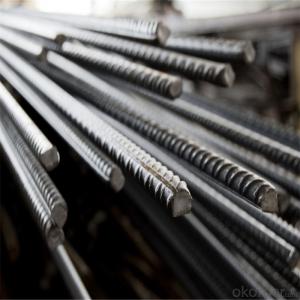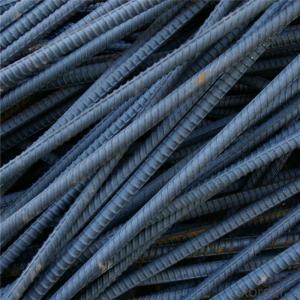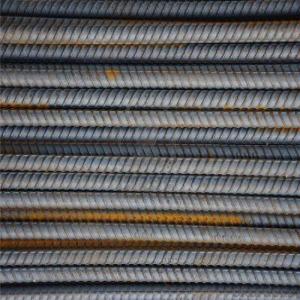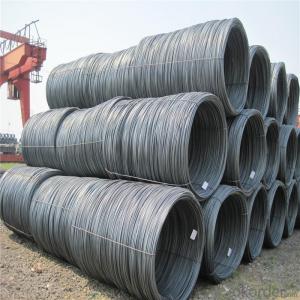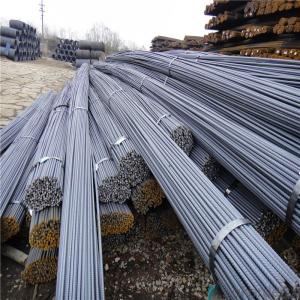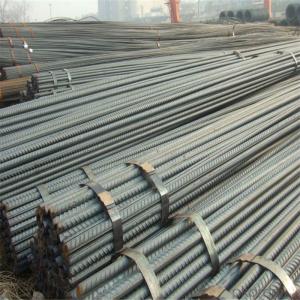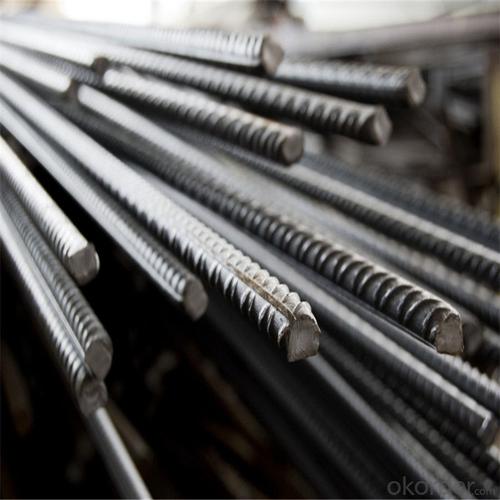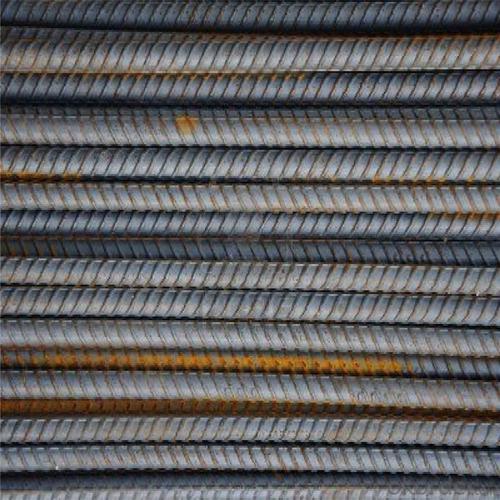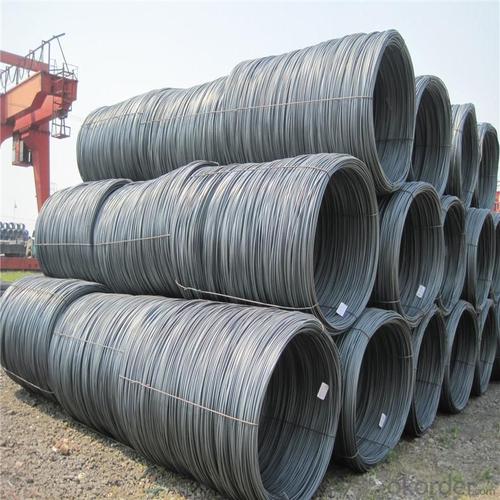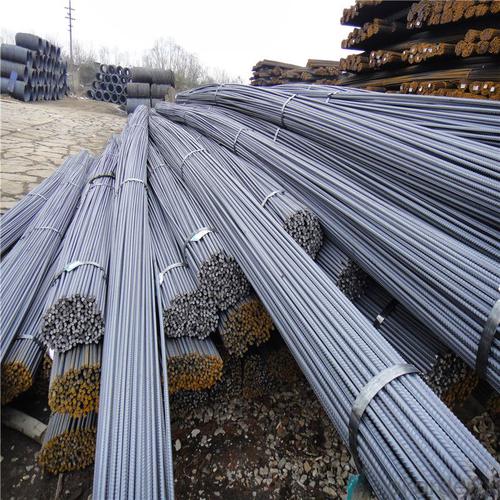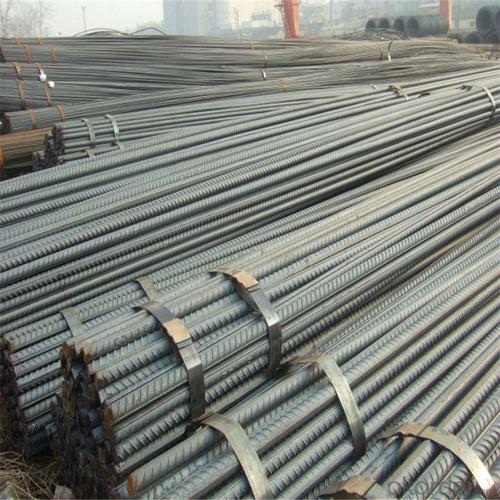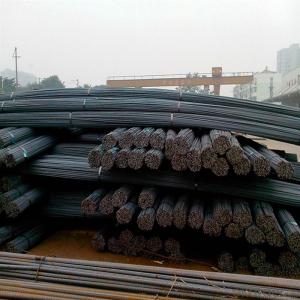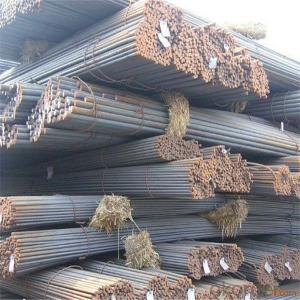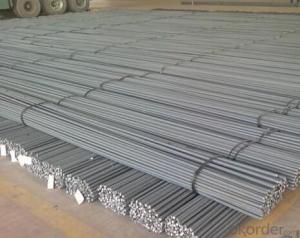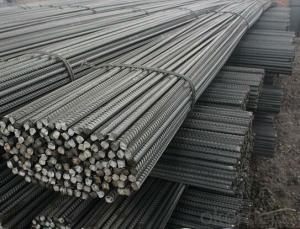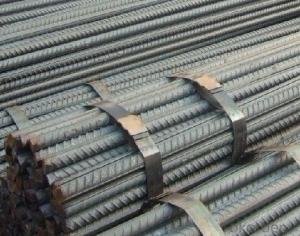16Mm Steel Rebar for Construction
- Loading Port:
- Tianjin
- Payment Terms:
- TT OR LC
- Min Order Qty:
- 150 m.t.
- Supply Capability:
- 400000 m.t./month
OKorder Service Pledge
OKorder Financial Service
You Might Also Like
Specification
16Mm Steel Rebar for Construction
Description of 16Mm Steel Rebar for Construction
1, Diameter: 5.5mm-10mm 16Mm Steel Rebar for Construction
10m- 40mm 16Mm Steel Rebar for Construction
2, Length: 6m, 9m, 12m or customized
3, Standard: GB, ASTM, AISI, SAE, DIN, JIS, EN
2, Produce Process: hot rolled or forged or cold rolled
3, Heat Treatment: annealing, normalizing, tempering, quenching
4, Surface Treatment: Black
5, Quality Assurance: We accept third party inspection for all orders.
Chemical Composition of 16Mm Steel Rebar for Construction
Grade | Technical data of the original chemical composition(%) | |||||
Reinforcing steel bar HRB335 | C | Mn | Si | S | P | B |
≤0.25 | ≤1.60 | ≤0.80 | ≤0.045 | ≤0.045 | >0.0008 | |
Physics Capability | ||||||
Yield Strength(N/cm2) | Tensile Strength(N/cm2) | Elongation(%) | ||||
≥ 335 | ≥490 | ≥16 | ||||
Reinforcing steel bar HRB400 | C | Mn | Si | S | P | B |
≤0.25 | ≤0.16 | ≤0.80 | ≤0.045 | ≤0.045 | 0.04-0.12 | |
Physics Capability | ||||||
Yield Strength(N/cm2) | Tensile Strength(N/cm2) | Elongation(%) | ||||
≥ 400 | ≥ 570 | ≥ 14 | ||||
Products Show of 16Mm Steel Rebar for Construction
Company Information
CNBM International Corporation is the most important trading platform of CNBM group.
Whith its advantages, CNBM International are mainly concentrate on Cement, Glass, Iron and Steel, Ceramics industries and devotes herself for supplying high qulity series of refractories as well as technical consultancies and logistics solutions.


F A Q
1, Your advantages?
professional products inquiry, products knowledge train (for agents), smooth goods delivery, excellent customer solution proposale
2, Test & Certificate?
SGS test is available, customer inspection before shipping is welcome, third party inspection is no problem
3, Factory or Trading Company?
CNBM is a trading company but we have so many protocol factories and CNBM works as a trading department of these factories. Also CNBM is the holding company of many factories.
4, Payment Terms?
30% TT as deposit and 70% before delivery.
Irrevocable L/C at sight.
5, Trading Terms?
EXW, FOB, CIF, FFR, CNF
6, After-sale Service?
CNBM provides the services and support you need for every step of our cooperation. We're the business partner you can trust.
For any problem, please kindly contact us at any your convenient time.
We'll reply you in our first priority within 24 hours.
- Q: What are the different alloying elements used in special steel?
- There are various alloying elements used in special steel, including chromium, nickel, molybdenum, vanadium, tungsten, manganese, and silicon, among others. These elements are added in specific quantities to enhance the steel's properties such as corrosion resistance, hardness, toughness, and heat resistance, making it suitable for specific applications in industries like aerospace, automotive, and construction.
- Q: What are the requirements for special steel used in mining equipment manufacturing?
- The requirements for special steel used in mining equipment manufacturing typically include high strength and toughness to withstand the harsh operating conditions, excellent wear resistance to endure abrasive materials, good corrosion resistance to resist chemical exposure, and high fatigue strength to withstand repeated loading. Additionally, the steel should have good weldability and machinability to facilitate fabrication processes.
- Q: How does special steel contribute to the thermal conductivity of products?
- Special steel can significantly contribute to the thermal conductivity of products due to its unique composition and properties. Special steel is manufactured with specific alloying elements, such as chromium, nickel, molybdenum, or vanadium, which enhance its thermal conductivity. These alloys help in the efficient transfer of heat by increasing the free electron density within the steel. The presence of alloying elements in special steel improves its lattice structure, allowing for better heat transfer. The increased free electron density enables quick and efficient movement of thermal energy through the material. As a result, special steel can effectively conduct heat from one area to another, making it ideal for applications requiring high thermal conductivity. Furthermore, special steel is often processed using advanced techniques like heat treatment, forging, or rolling, which further optimize its properties. These processes refine the microstructure of the steel, reducing impurities and improving its thermal conductivity. The resulting steel product exhibits enhanced heat transfer capabilities and provides efficient thermal management. The high thermal conductivity of special steel makes it highly desirable for various industries and applications. It is commonly used in the manufacturing of heat exchangers, boilers, furnaces, and other thermal equipment where efficient heat transfer is crucial. Additionally, special steel is often employed in electrical appliances, such as stovetops or induction cookers, where rapid and uniform heat distribution is necessary. In summary, special steel contributes to the thermal conductivity of products by utilizing specific alloying elements and advanced processing techniques to enhance its heat transfer capabilities. Its high thermal conductivity makes it a valuable material for various industries, ensuring efficient heat management and optimal performance of thermal equipment and appliances.
- Q: What are the different types of nitriding steel?
- There are several types of nitriding steel, including gas nitriding steel, salt bath nitriding steel, plasma nitriding steel, and ion nitriding steel. Each type of nitriding steel has its own unique characteristics and advantages, making them suitable for different applications and industries.
- Q: Can special steel be used for automotive engine components?
- Yes, special steel can be used for automotive engine components. Special steels, such as high-strength alloys or heat-resistant grades, are often utilized in critical engine parts like crankshafts, camshafts, connecting rods, valves, and pistons. These specialized steels offer enhanced strength, durability, and resistance to wear and high temperatures, ensuring reliable performance and longevity in demanding automotive engine applications.
- Q: What are the different methods of measuring the hardness of special steel?
- There are several methods of measuring the hardness of special steel, including the Rockwell hardness test, Vickers hardness test, Brinell hardness test, and the Knoop hardness test. These methods involve applying a specific force or load to a small area of the steel surface and measuring the depth or size of the resulting indentation. Each method has its own advantages and is suitable for different types of steel and specific applications.
- Q: How does special steel perform in hot forging processes?
- Special steel is specifically engineered to endure high temperatures and excel in hot forging procedures. When subjected to extreme heat, special steel retains its strength and hardness, rendering it perfect for utilization in hot forging applications. One of the principal benefits of special steel in hot forging lies in its superb heat resistance. It can endure elevated temperatures without compromising its structural integrity, guaranteeing the preservation of its desired properties throughout the forging process. This enables the production of forged components with consistent quality and dimensional accuracy. Moreover, special steel demonstrates commendable thermal conductivity, aiding in the even distribution of heat during forging. This facilitates efficient heating and diminishes the likelihood of localized overheating or cold spots. The uniform distribution of heat also contributes to a homogeneous grain structure, enhancing the overall strength and mechanical properties of the forged parts. Furthermore, special steel possesses exceptional wear resistance and toughness, even in elevated temperatures. This ensures that the steel can withstand the substantial forces and pressures involved in the hot forging process without succumbing to deformation or failure. The combination of high strength, wear resistance, and toughness allows for the production of forged components capable of enduring heavy loads and harsh operating conditions. Additionally, special steel lends itself to easy machining and shaping, enabling the forging of intricate designs and complex forms. This versatility makes it suitable for a broad range of hot forging applications, including automotive parts, industrial machinery components, and aerospace components. In conclusion, special steel excels in hot forging processes. Its heat resistance, thermal conductivity, wear resistance, toughness, and machinability establish it as an ideal material for the production of high-quality, long-lasting, and intricate forged components.
- Q: What is the difference between special steel and regular steel?
- Special steel refers to a specific type of steel that has been enhanced with additional alloying elements or has undergone specialized treatments to enhance its strength, durability, or other desired properties. Regular steel, on the other hand, refers to common or standard steel that does not possess these additional features or improvements. The key difference lies in the composition and processing, as special steel is engineered to meet specific requirements for particular applications, such as high-temperature resistance, corrosion resistance, or increased hardness.
- Q: What are some common applications of special steel?
- Some common applications of special steel include manufacturing of automobiles, aircraft, and machinery, as well as in construction, oil and gas pipelines, and power generation. It is also used in the production of tools, cutlery, and surgical instruments, due to its durability, strength, and corrosion resistance properties.
- Q: What are the different methods of improving the machinability of special steel?
- There are several methods that can be employed to improve the machinability of special steel. These methods include: 1. Alloying: By introducing certain alloying elements, such as sulfur, selenium, lead, or bismuth, into the steel composition, the machinability can be enhanced. These elements act as lubricants during machining, reducing friction and cutting forces. 2. Heat treatment: Heat treatment processes like annealing, normalizing, or stress relieving can help improve the machinability of special steel. These processes refine the microstructure, reduce hardness, and increase ductility, making the material easier to machine. 3. Microstructural modifications: Modifying the microstructure of special steel through processes like grain refinement or controlled precipitation of carbides can enhance machinability. Fine-grained steels are generally easier to machine due to reduced cutting forces. 4. Surface coatings: Applying specialized coatings, such as titanium nitride (TiN) or diamond-like carbon (DLC), on the surface of special steel can reduce friction, improve tool life, and enhance chip flow during machining. 5. Tool selection and optimization: Choosing appropriate cutting tools with specific geometries, coatings, and cutting parameters can significantly improve machinability. Optimal tool selection ensures efficient chip evacuation, reduces heat generation, and minimizes tool wear. 6. Machining parameters optimization: Adjusting machining parameters like cutting speed, feed rate, and depth of cut can have a significant impact on machinability. Fine-tuning these parameters can help reduce tool wear, control chip formation, and achieve better surface finish. 7. Lubrication and cooling: Proper lubrication and cooling methods, such as using cutting fluids or coolants, can enhance machinability by reducing friction and heat generation during machining. This helps prolong tool life and minimize workpiece deformation. It is important to note that the specific method or combination of methods used to improve machinability will depend on the type of special steel and the desired machining outcome.
Send your message to us
16Mm Steel Rebar for Construction
- Loading Port:
- Tianjin
- Payment Terms:
- TT OR LC
- Min Order Qty:
- 150 m.t.
- Supply Capability:
- 400000 m.t./month
OKorder Service Pledge
OKorder Financial Service
Similar products
Hot products
Hot Searches
Related keywords
